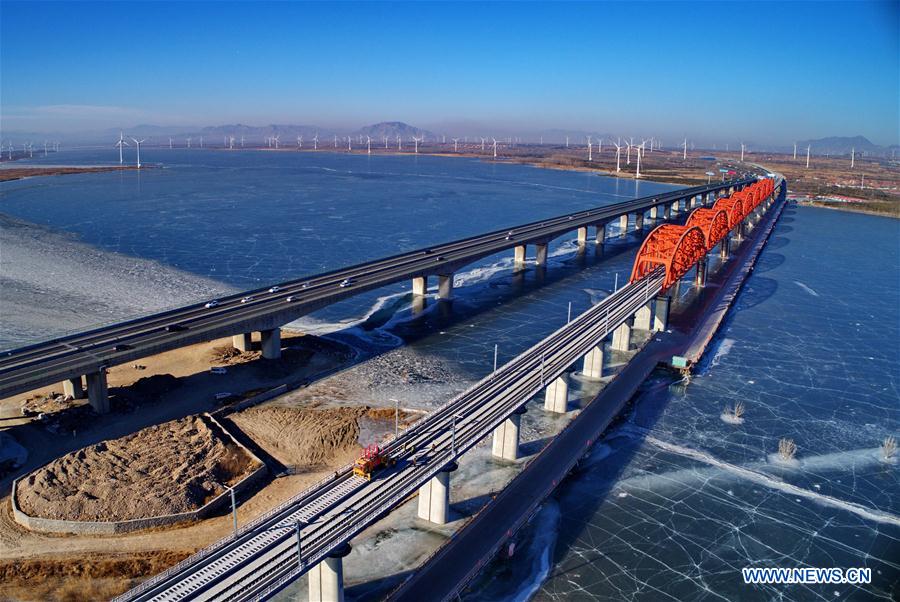Three years from Winter Games, 'Twice Olympic City' Beijing marches toward excellence
Three years from Winter Games, 'Twice Olympic City' Beijing now marches toward excellence.
300 million people involved in winter sports
To broaden the influence of the Beijing Games, China has plans to encourage 300 million people to take part in winter sports.

"We can see the great progress, but what is even more important is we can see the plan raised by Chinese President Xi Jinping to make 300 million people familiar with winter sports obviously already works. We have met many children who love winter sports. We have seen athletes practicing winter sports. We have seen the halfpipe and other slopes which are already hosting international competitions. The progress is really impressive," Bach said.
"Just think about the 300 million participants in winter sports. It is a remarkable contribution to the Olympics in itself," said Yang Yang, former IOC member and current Chair of the Athletes' Commission for Beijing 2022.
Yang's comment was echoed by Gilbert Felli, Senior IOC Consultant and former Olympic Games Executive Director.
"The 300 million plan's contribution towards the Olympic movement is clear. China is becoming an important winter sports nation," he said.
While China's northeastern provinces have long been the epicenter of the country's winter sports, increasing numbers of indoor ice and ski arenas are now being constructed in China's sub-tropical south. Ice rinks can even be found in shopping malls in Haikou, capital city of Hainan, China's southernmost province that boasts a tropical climate.
"Promoting 300 million people to participate in winter sports is not only your aim, but also the IOC's aim. The IOC and international winter sports federations will jointly support China," Chair of the IOC Coordination Commission for Beijing 2022 Juan Antonio Samaranch said.
Olympics for a better life
Three and a half years after Beijing was awarded the 2022 Games, Yue Haile's monthly income has risen almost fivefold to nearly 5,000 yuan (around 740 U.S. dollars).
Yue, a Chongli native, became a coach in a local skiing club, which marked a turning point in her life.
Yue is employed by the club owner Zhang Yan, who started his skiing business in the county ten years ago.
At that time, the impoverished county had a population of only 30,000 and there was only one hotel available for travelers to stay in, Zhang recalled.
"But I found that there are more places suitable for skiing in Chongli than in Beijing. The ski track is longer and it is much more enjoyable to ski here, and it is not far from Beijing," said the ski enthusiast.
With a firm belief that Chongli would become a popular ski destination in the future, Zhang opened the first three-star hotel in Chongli in 2009 and launched a ski training club five years later.
"I think it will only take five years for China's winter sports industry to reach the level that other countries spent 50 years to get to," Zhang estimated.
In the past few years, the economy of Chongli and Zhangjiakou has thrived, with rapid development in transport, industry and the environment.
Many locals, who previously left the region in search of better job opportunities elsewhere, now work in their hometown's skiing industry.
Thaiwoo, one of Chongli's ski resorts, recorded a 35 percent year-on-year increase in tourists in the 2018-2019 season.
"Living comfortably at home, we don't have to wander out and leave the children to the elders," Yue said.
Surrounding Beijing and Tianjin geographically, Hebei Province, in which Chongli is located, lags far behind the two cities in terms of economy and public services, and its counties bordering the two cities were once described as a "poverty belt."
The transformation of Chongli has been largely attributed to the preparation of the Winter Olympics, which sped up the poverty alleviation process.
"The organization of the Games is important, but it is just one part of China's long-term development strategy. It is contributing to the social development of China," Bach said.
China has set 2020 as the target year to finish the building of a moderately prosperous society in all aspects, with poverty eradicated and GDP and per capita income doubling that in 2010.
In the process, Beijing 2022 is considered a historical opportunity to speed up the development of the Beijing-Tianjin-Hebei region.
"The whole world knows the Winter Olympics, but doesn't know how poor Zhangjiakou used to be," said Communist Party of China (CPC) Zhangjiakou Municipal Committee Secretary Hui Jian. "Hebei had ten poverty-stricken counties, among which Zhangjiakou had five."
Hui is dedicated to leading Zhangjiakou out of poverty through Beijing 2022.
"By 2022, Zhangjiakou will not be what it looks like now. Zhangjiakou will become a window of a moderately prosperous society," Hui said with confidence.

